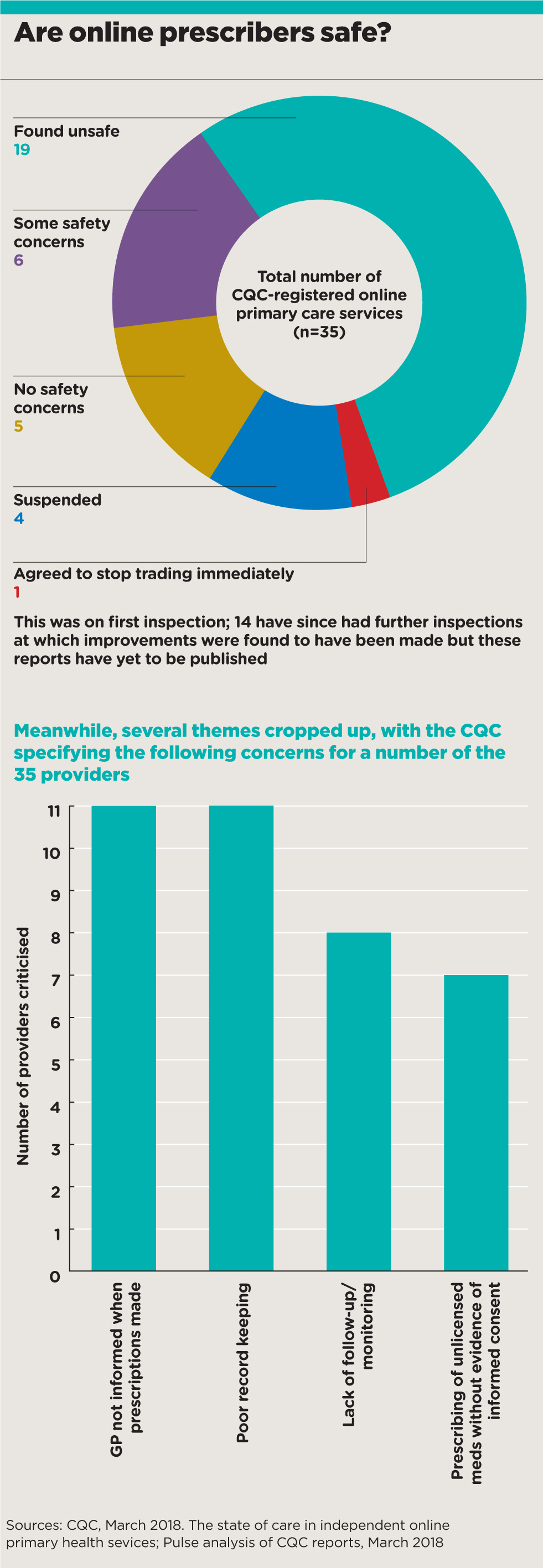Exclusive GPs are being kept in the dark over what drugs their patients are taking, as private online services fail to inform them about what they have prescribed.
A Pulse analysis of CQC reports found that a third of online prescribers have been criticised for not informing a patient’s GP after prescribing medications such as inhalers and opioids, including in one case for over two years.
Nearly a quarter were warned over a lack of follow-up or monitoring and 20% for prescribing unlicensed medications without evidence of informed consent.
It comes as last week, the CQC released a report which said 43% of the 35 online prescribers it inspected were ‘not providing safe care’ – with some even shut down permanently or temporarily as a result.
The Pulse analysis of the 35 individual inspection reports shows that at least 11 of the 35 specifically mentioned a failure to share information with the patient’s GP among their criticisms. This included two services shut down by the CQC – Doctor Matt and MD Direct.
Even Babylon Healthcare was criticised by inspectors in its report. The company initiated legal proceedings that had prevented the initial inspection report being released.
It was eventually made available last December, and states that six out of 10 patients prescribed medicines for asthma and four out of five patients prescribed medicines with potential for misuse ‘had not had the details of their consultation shared with their registered GP’.
A Babylon spokesperson said: ‘As reported in December, Babylon was in “the top quartile of most favourable reports carried out by the CQC” and its services were “safe, effective, caring, responsive and well-led”.’
Babylon states on its website that the concerns raised in the inspection relate to patients for whom it was not the primary care provider, and do not apply to its GP at Hand service.
Dr Bill Beeby, deputy GPC policy lead for prescribing, said: ‘Like many of my colleagues, everything I can think of about it carries the word “risk” and everything it has been sold on is based on convenience. It seems to be based on individuals being able to obtain whatever they desire and there is no way of being able to check whether a patient is telling the story or the truth.
‘We had one patient who was prescribed antibiotics for an infected cyst in a delicate place. Fortunately the patient came in, and it turned out the diagnosis was wrong. There’s probably quite a lot of others who we don’t see and don’t hear about.’
The CQC’s own report into online prescribing found inappropriate prescribing of painkillers and antibiotics – with the latter handed out to patients who were given the option to choose which one they wanted, at what dose and for how long. The regulator also found over prescription of asthma inhalers, and use of credit card details as a way of verifying a patient’s identity.
Even more fundamentally, it stated that online prescribers are ‘not collecting patient information or sharing information with a patient’s NHS GP’ – meaning GPs can’t be sure who is prescribing for their patients.
In one case, a provider had failed to share more than 400 patient contacts with GPs. In another instance, ‘opioid analgesics and other analgesics subject to misuse had been prescribed for up to two years without contacting the patient’s GP and with no access to the patient’s full medical record’, the report says.

Online prescribing
Pulse October survey
Take our July 2025 survey to potentially win £1.000 worth of tokens

Visit Pulse Reference for details on 140 symptoms, including easily searchable symptoms and categories, offering you a free platform to check symptoms and receive potential diagnoses during consultations.











